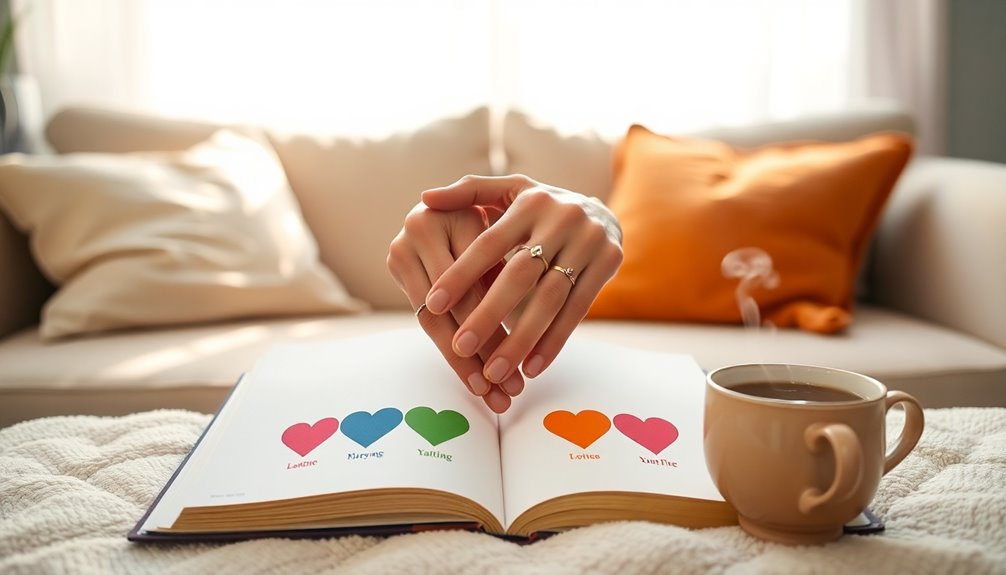Love's uncertainty can make you anxious about your partner's commitment. You might worry if feelings will last or change tomorrow. This fear often stems from emotional instability and societal pressures, making it essential to embrace the unknown. Open communication and clarity in your relationship can foster trust and deepen emotional connections. While some level of unpredictability can spice things up, too much can lead to confusion. It's all about balancing familiarity with a bit of surprise. If you explore this topic further, you'll discover how to navigate these feelings for a healthier, more fulfilling relationship.
Key Takeaways
- Love inherently involves uncertainty, creating both excitement and anxiety about the future of the relationship.
- Open communication about feelings and expectations can help mitigate doubts about commitment and affection.
- Emotional stability in relationships thrives on a blend of predictability and surprises, fostering deeper connections.
- External stressors and crises can shift partner preferences, revealing the dynamic nature of love and attraction.
- Regular reassessment of relationship goals and mutual support strengthens bonds and enhances long-term commitment.
The Nature of Uncertainty in Love

While love can bring joy and connection, it often comes with a heavy dose of uncertainty that can leave you feeling anxious and restless. You might find yourself questioning what the future holds or whether your partner will remain by your side. This fear of the unknown can trigger doubts about your worth and your partner's commitment. Emotional instability arises, fueled by societal and familial expectations that weigh heavily on your heart. Understanding that uncertainty is a natural part of relationships can help you navigate these feelings. By recognizing the emotional impact of uncertainty, you can begin to embrace the journey of love, fostering trust and open communication while allowing space for growth and exploration with your partner. Additionally, recognizing the importance of clear communication during a breakup can help prevent misunderstandings and build a stronger foundation. Embracing uncertainty can ultimately enhance the overall relationship experience.
Partner Preferences During Crisis

As crises unfold, like the recent pandemic, you may find your partner preferences shifting in unexpected ways. Uncertainty can reshape what you value in a partner, revealing a dynamic nature to attraction. Emotional states and motivations influence your preferences more than you might think, reflecting how external stressors affect your desires. During tough times, you might be drawn to qualities like stability or support that resonate with your current needs. Interestingly, research indicates that preferences are not as stable as commonly perceived, highlighting how external circumstances can alter attraction. In fact, during challenging periods, many individuals prioritize emotional intimacy as a crucial aspect of their partner preferences. Curiously, many couples reported no change or even an increase in their desire for each other, suggesting that strong relationships can adapt. Steering through these shifts requires embracing the uncertainty while seeking mutual support, ultimately helping you cultivate deeper connections despite the challenges you face. Understanding the impact of stress on relationships can further enhance your ability to navigate these changes effectively.
Influence of Facial Features

Facial features play a crucial role in attraction, shaping not only who you find appealing but also how you perceive potential partners.
You might notice that faces closer to the average within your population often strike you as more attractive. This facial averageness, which encompasses geometrically average faces, tends to evoke a sense of charm and beauty. Interestingly, higher facial masculinity is linked to increased attractiveness in males, illustrating how certain traits can influence perception.
Additionally, you may find yourself drawn to partners with facial features resembling your own, as this similarity fosters a sense of kinship and trustworthiness.
While higher facial masculinity in men can boost attractiveness ratings, it mightn't hold the same weight for women.
Ultimately, your preferences are also influenced by personal experiences and interactions, making your attraction uniquely yours.
Psychological Dynamics in Attraction

Attraction doesn't just hinge on physical appearance; it's deeply rooted in psychological dynamics that shape how you connect with others. Factors like proximity and familiarity play significant roles, as being near someone often leads to increased interaction and comfort. Shared interests and values create a sense of compatibility, while positive emotions foster attraction. The mere exposure effect suggests that frequent encounters can enhance your preference for someone. Additionally, the psychological dynamics of attraction reveal that emotional engagement can intensify your connection, particularly when uncertainty is present. Reciprocal liking heightens attraction when someone reciprocates your feelings, but uncertainty can add intrigue, prompting you to think more about the person. Sometimes, emotional engagement arises from this uncertainty, intensifying your connection. Ultimately, personality traits and shared experiences further amplify attraction, illustrating the intricate web of psychological factors at play in your relationships.
Real-World Implications for Relationships

While relational uncertainty can feel intimidating, it also offers valuable insights into your relationships. This uncertainty might lead to dissatisfaction and emotional strain, making communication essential.
You'll want to express your feelings and concerns openly to avoid misdirected anxiety. By discussing shared goals and values, you can strengthen your connection and enhance teamwork. Additionally, recognizing that cultural norms shape relationship behaviors can provide context for managing these uncertainties together. For instance, couples who travel together often find that shared experiences can strengthen their bond and create lasting memories.
Remember, some uncertainty can even spark excitement, providing a break from monotony. Embracing mindful design in your relationship, like creating a "Story of Us," can help you focus on the present rather than fixating on the future.
Use this uncertainty as an opportunity to recalibrate your priorities, fostering deeper understanding and resilience together.
Theories on Uncertainty and Love

Understanding the theories surrounding uncertainty and love can illuminate the complexities of your relationships.
Uncertainty Reduction Theory suggests you're motivated to reduce ambiguity through communication. When uncertainty is high, you may experience cognitive and behavioral doubts, prompting you to seek more information about yourself, your partner, and the relationship. This often leads to lower intimacy levels. In contexts like parenting dilemmas, individuals may experience similar uncertainties regarding their roles and responsibilities in relationships. Establishing strong communication skills can help mitigate these doubts and enhance relationship satisfaction. Furthermore, recognizing narcissistic behaviors in a partner can play a significant role in addressing underlying uncertainties. Additionally, understanding the importance of emotional support during challenging times can foster resilience in relationships, which may be crucial for navigating complexities in love.
Secure attachment styles help minimize these uncertainties, boosting confidence and improving relationship dynamics. Conversely, insecure attachments can heighten doubts, creating challenges.
While some uncertainty can spark excitement and prevent boredom, excessive ambiguity can be detrimental. Balancing uncertainty and clarity is essential for sustaining interest and deepening connections in your intimate relationships. Establishing healthy boundaries can also provide clarity and prevent misunderstandings in these situations.
Frequently Asked Questions
How Can I Improve My Dating Profile During Uncertain Times?
To improve your dating profile during uncertain times, focus on honesty about what you want.
Highlight your genuine interests and use positive language. Inject humor to make your profile memorable and invite connection.
Ask friends for feedback to guarantee it reflects your true self. Personalize your messages to potential matches, and engage in meaningful conversations early on.
Stay upbeat and open-minded, as a positive outlook can attract like-minded individuals.
Are There Specific Traits That Attract Partners in Stable Conditions?
When you're looking for a partner in stable conditions, focus on traits that truly matter.
Physical attractiveness and health can signal liveliness, while intelligence and emotional stability suggest long-term compatibility. Earning potential also plays a role, especially for women seeking security.
Additionally, shared values and personality traits, like conscientiousness and curiosity, foster connection.
How Does Social Media Influence Partner Preferences?
Social media influences your partner preferences by shaping how you perceive potential mates. You might find yourself drawn to profiles showcasing attractive lifestyles or traits, which can heighten expectations.
Constant exposure to curated images and interactions may lead you to compare your partner to others, impacting your satisfaction. Additionally, social media can create opportunities for connection, but it can also spark jealousy or distrust, complicating your feelings about who you're attracted to.
Can Uncertainty Affect Long-Term Relationship Satisfaction?
Uncertainty can definitely affect your long-term relationship satisfaction. When you're unsure about your partner's feelings or the future, it creates stress and anxiety, which can lead to dissatisfaction.
Poor communication often exacerbates this uncertainty, making it harder to connect. However, embracing some uncertainty can also spark excitement.
What Role Do Cultural Differences Play in Partner Preferences?
Cultural differences play a significant role in shaping partner preferences. You might find that values, beliefs, and traditions influence who you're attracted to and how you connect.
Respecting and acknowledging these differences can enhance your relationship, allowing you to appreciate each other's backgrounds. Open communication about cultural practices fosters understanding and integration, helping you navigate conflicts and celebrate shared values.
Ultimately, embracing diversity can strengthen your bond and deepen your connection.
Conclusion
In traversing love's uncertainty, you'll find that it's natural to question your feelings and your partner's commitment. Understanding the factors that influence attraction can help you build stronger connections, even in challenging times. Embrace the unpredictability of love, as it often leads to growth and deeper bonds. By acknowledging the psychological dynamics at play, you can foster resilience in your relationships, ultimately discovering that love can endure, despite the uncertainties that may arise.







